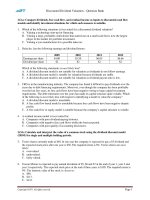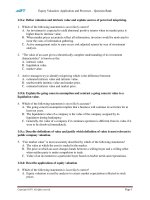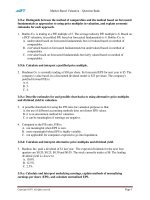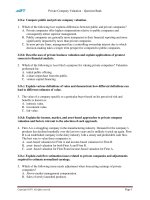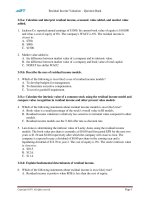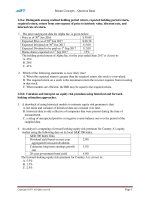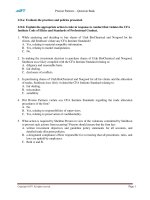CFA 2018 level 2 ethics quest bank glenarm company
Bạn đang xem bản rút gọn của tài liệu. Xem và tải ngay bản đầy đủ của tài liệu tại đây (81.99 KB, 2 trang )
Glenarm Company – Question Bank
LO.a: Evaluate the practices and policies presented.
LO.b: Explain the appropriate action to take in response to conduct that violates the CFA
Institute Code of Ethics and Standards of Professional Conduct.
1. Does Sherman violate any CFA Institute Standards, while accepting a job offer from
Glenarm Company, a competitor of Sherman’s existing employer?
A. No.
B. Yes, loyalty to employer.
C. Yes, disclosure of conflicts.
2. While at Pearl, did Sherman violate any CFA Institute Standards, by working as an
independent consultant?
A. Yes, additional compensation arrangements.
B. No.
C. Yes, disclosure of conflicts.
3. In preparing to leave Pearl, did Sherman violate any CFA Institute Standards, while soliciting
clients for Glenarm?
A. Yes, by soliciting the existing and potential clients.
B. No, because he conducted social calls after “office hours.”
C. No, because he told several of Pearl’s clients and prospects to delay their move until he
joined Glenarm.
4. In his transition from Pearl to Glenarm, did Sherman violate any CFA Institute Standards by
taking material that he had worked on with him to his new employment?
A. Yes, only the material that consisted of marketing presentations, and computer program
models.
B. No, because he had developed or prepared this material on his own.
C. Yes, all material because he misappropriated his current employer’s property.
5. Sherman’s consulting business while at Glenarm, least likely violates the CFA Institute
Standard relating to:
A. independence and objectivity.
B. disclosure of additional compensation arrangements.
C. referral fees.
6. What is the appropriate action required by Glenarm according to the CFA Institute Standards
in view of their employees pursuing independent practice? Glenarm should make it a firm
policy for all employees to:
A. conduct their independent business after office hours.
B. disclose in writing in advance all monetary and non-monetary benefits received in
addition to the compensation received from the firm.
C. declare any gifts that they receive from the existing clients.
Copyright © IFT. All rights reserved.
Page 1
Glenarm Company – Question Bank
Solutions
1. A is correct. No CFA Standard precludes its members or candidates from joining a
competing business. However, employees often have to sign non-compete agreements that
prohibit them from taking part in certain activities after leaving their employer. A departing
employee has to refrain from activities that would not be in the best interests of his employer.
2.
B is correct. No because Sherman disclosed his consulting business to Pearl.
3. A is correct. Sherman’s solicitations of Pearl’s existing and potential clients while still at
Pearl is a violation of Standard IV(A) – Loyalty. Even though the activity was conducted
after business hours or socially it caused harm to Pearl by attempting to lure its business
away.
4. C is correct. Sherman violated Standard IV(A) - Loyalty by taking material without Pearl’s
permission since all work done for Pearl was the exclusive property of Pearl. Sherman’s
efforts in researching or developing this work was in the context of his employment with
Pearl and was done for its benefit, inclusive of the ideas/research rejected by Pearl.
5. C is correct. Sherman violated IV(B) – Disclosure of Additional Compensation
Arrangements by not disclosing his consultancy to Glenarm and not obtaining written
consent from them. He also violated Standards I(B) – Independence and Objectivity and
Standard VI(A) – Disclosure of Conflicts. He must disclose to Glenarm his independent
practice which could compromise his independence and objectivity or interfere with his
duties to his current employer and clients.
6. B is correct. As a matter of policy, Glenarm should require all its employees to give in
writing in advance any compensation or benefits received from work done outside the firm
(independent practice).
Copyright © IFT. All rights reserved.
Page 2
